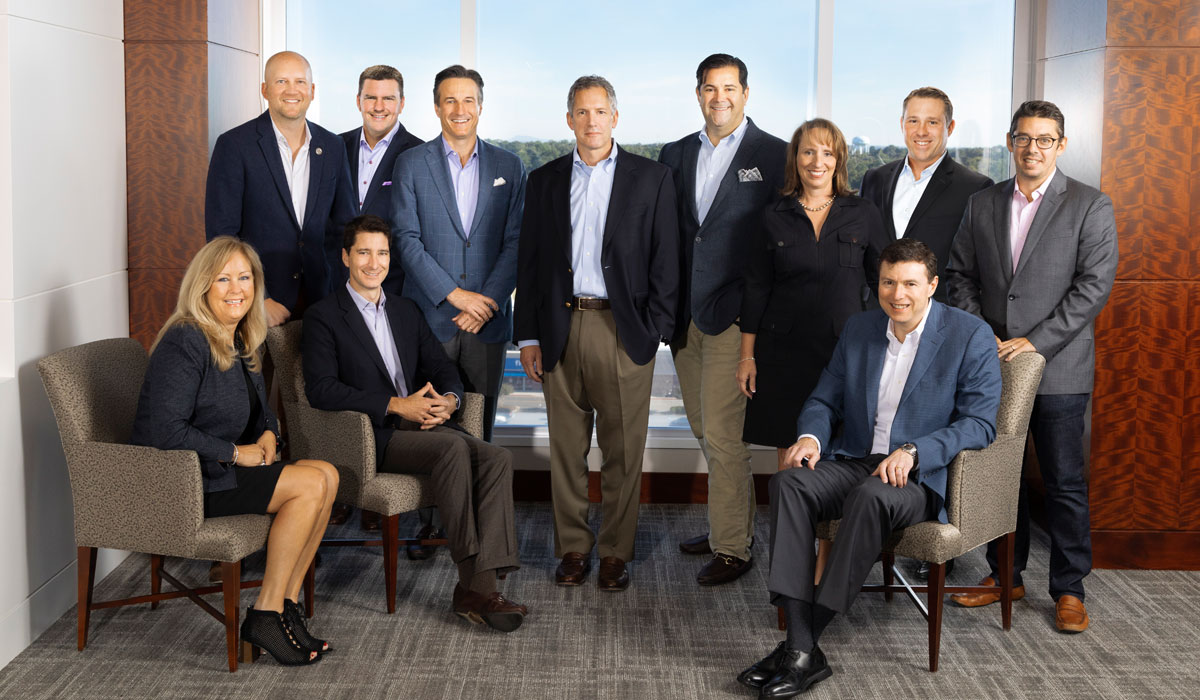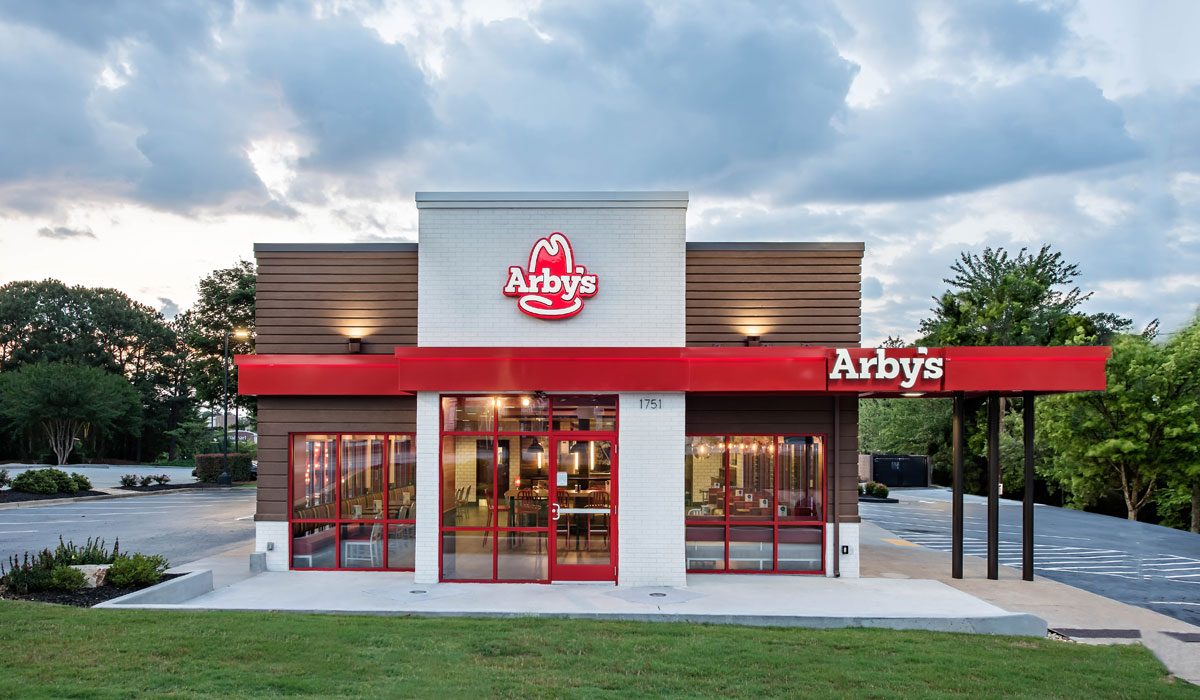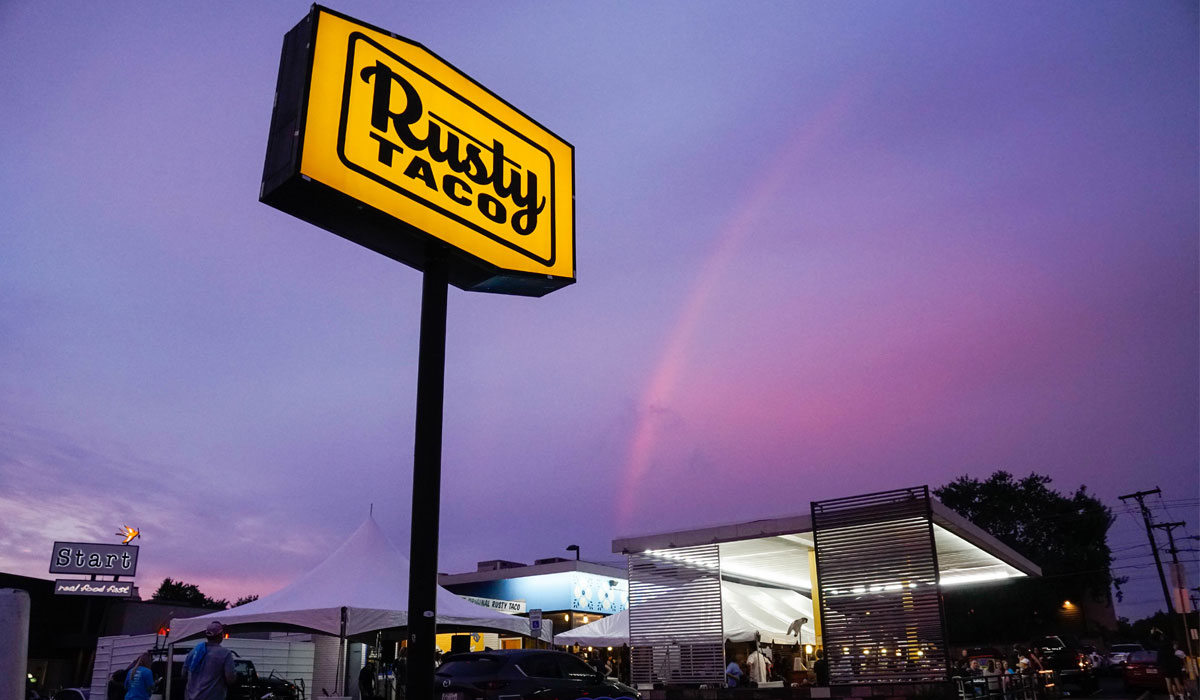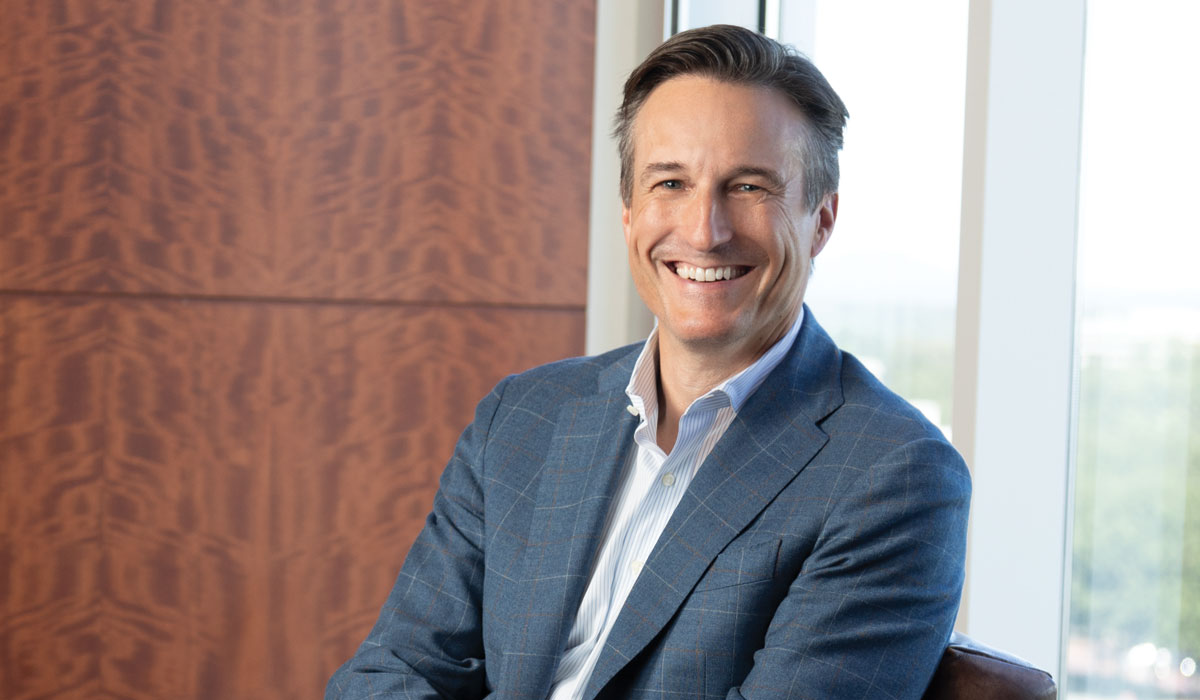There are several vantage points within Inspire Brands’ Atlanta headquarters from which employees can see twin gleaming glass office buildings rising above the treetops to the northwest, on the other side of Highway 19. The buildings are nondescript, appearing no different from the countless other office buildings dotting the landscape in the Sandy Springs suburb.
By early next year, though, one of the buildings will boast large white letters stretching across the top floor: I-N-S-P-I-R-E, the first “I” represented by a fork, the second by a spoon. That’s because it will soon become the next Inspire Global Support Center, with the company—parent to Arby’s, Buffalo Wild Wings, Rusty Taco, and, after a recent $2.3 billion acquisition, Sonic Drive-In—set to start moving some time in the spring.
RELATED:
How Inspire Brands plans to become the ‘preferred franchisor’
Sonic officially joins the Inspire Team
There are obvious reasons for Inspire’s impending move. The company committed to hiring 1,100 new corporate workers in Atlanta in the next six years. Space is already tight in the existing HQ, with corner offices being converted to extra conference rooms and many employees being bumped to spillover locations nearby. Today’s headquarters feels a bit out of 1995 with its cubicle seas; tomorrow’s, according to renderings, is being tailored to state-of-the-art, open-space designs favored by millennials.
But the buildings looming on the horizon to the northwest also represent something more than just enhanced office space: They represent a promising future, one in which Inspire is attempting to become a uniquely positioned restaurant company that leverages the collective resources of multiple brands to build long-term, shared success.
“That’s our key mantra, is we want the brands to be better—not just financially better, but we really want, from a guest perception and from a franchisee perception, there to be a noticeable difference between what the brand becomes once it’s part of the Inspire platform and what it was standalone,” says Paul Brown, Inspire CEO and mastermind behind this new strategic model. “That’s on the top line, not just on the bottom line. And that’s something that we’re really spending a lot of time making sure that we do.”
Creating the framework
In November 2017, Arby’s announced that it would acquire Buffalo Wild Wings for around $2.9 billion.
On its face, the move seemed a promising strategic positioning for Arby’s. The sandwich concept was building on momentum that had started when Brown arrived as CEO in 2013 and continued through the massive success of its “We Have the Meats” marketing campaign. Buffalo Wild Wings occupied a much less cluttered category as a national sports bar, but its sales comps were dropping, and the company had suffered through high-profile franchisee dissatisfaction, executive shakeups, and an attempted hostile takeover from hedge fund Marcato. It was ready for a brand refresh, and Brown seemed a great candidate to spearhead the project.
“This is not just Arby’s buying Buffalo Wild Wings or Sonic. This is Arby’s buying a company, integrating the company, and changing from a single-branded company to a multi-branded organization.” — Christian Charnaux, Inspire Brands’ chief growth officer.

What happened next, though, was unprecedented. Brown and Neal Aronson, founder and managing partner of Roark Capital Group, partnered in February to launch Inspire Brands, an umbrella under which they would acquire several multibillion-dollar concepts and create a shared-services structure that would allow each brand under the umbrella to benefit from and build off the strengths of the others. (Roark is majority owner of Inspire.)
“If you think about the framework around how you approach a brand and how you approach executing on that, in many ways it’s very similar, right?” Brown says. “Yes, one brand has a different service model than the other. But at the core … whether it be culinary, whether it be labor scheduling, whether it be marketing, all those core skill sets are fundamentally similar. And we can learn from each other.”
Before the Sonic acquisition, Inspire’s collective system boasted some $7.6 billion in system-wide sales, 4,700 locations, and more than 400 franchisees. The Sonic deal, which is expected to close by the end of the year, adds another $4.4 billion in system-wide sales, 3,600-plus restaurants, and 300-plus franchisees.
Even before acquiring Sonic, Inspire was one of the top 10 largest restaurant companies in the U.S., and the largest multi-brand owner-operator of restaurants (Arby’s owns around 1,100 locations; Buffalo Wild Wings, more than 600).
But while many industry insiders have pointed to restaurant holding companies like Yum! Brands, Darden Restaurants, and JAB as models for what Inspire is trying to accomplish, executives push back on the notion. Inspire is establishing a much more integrated model, they say, one in which each individual brand relies much more on the resources of the other.
“This is not just Arby’s buying Buffalo Wild Wings or Sonic. This is Arby’s buying a company, integrating the company, and changing from a single-branded company to a multi-branded organization,” says Christian Charnaux, Inspire’s chief growth officer. “That is a huge amount of effort from a lot of folks, and there’s been a tremendous amount of effort put out in the past year.”

Atop the “cultural foundation” that is Inspire, there are eight key areas that the company is leveraging its collective strength to the betterment of all its brands: human resources, finance, legal, IT, development, communications, customer personalization and insight, and media. The four brands under the Inspire umbrella, plus any future acquisitions, will enjoy independent brand identities but pull from these “centers of excellence.”
Brown says it’s a model that learns from his old industry, hotels (he was with Hilton Worldwide from 2008 to 2013, including a stint as president of brands and commercial services). Hotels, he says, were ahead of the restaurant industry by creating value from within a multi-branded structure.
He points to some specific ways each Inspire brand can benefit from the others: Buffalo Wild Wings, for example, has already explored loyalty programs and off-premises platforms like delivery, and can disseminate those lessons for the Arby’s business. Conversely, Buffalo Wild Wings can learn from operational efficiencies like speed of service and convenience that Arby’s has aced in the quick-service industry. Or, from a more nuts-and-bolts perspective, Inspire brands can collectively purchase better media in their existing markets.
Then there’s the glimpse each Inspire brand is now afforded at a much wider swath of American restaurant consumers.
“The data and architecture associated with customer insights, operational analytics, development analytics—those are shared services that we have created that all brands today get a benefit from,” Brown says. “That should have a directly positive impact on the business. Our franchisees will benefit from that, as well, just being able to make more intelligent decisions around consumer trends or … when it comes to tactical marketing and promotional marketing, the analytics around what worked, what didn’t work, and how we make those adjustments.”
Spend a significant amount of time with Inspire executives (as this writer did) and you might start to hear the word “scale” echoing in your head. And there’s good reason for that: Inspire is placing a bet on the sum of its parts, relying on the scale it can achieve with multiple brands to better serve the individual businesses and franchisees.

In other words, what makes Inspire so potent is its collective power in nearly all facets of foodservice.
“We’re making some meaningful investments in data analytics and technology, which we can now spread over a larger base of multiple brands,” Charnaux says. “By doing that, it’s in many ways a fixed cost or fixed investment; we can make bigger bets on bigger capabilities and share those capabilities over a broader set of brands.”
He adds that there are a number of cases where Inspire can pull from “a pretty expansive data lake,” from demand forecasting to labor models and one-to-one marketing. In fact, Inspire has doubled down so much on data analytics that it’s expanded that team from four or five employees to more than 50.
Arby’s president Rob Lynch, whom Brown recruited to join the company originally as CMO, goes one further in explaining just how important the scale of Inspire’s collective assets is to each brand’s success. He thinks it’s an unfair advantage in today’s increasingly competitive restaurant industry—one that will be necessary for any meaningful growth and innovation.
“We really do believe that scale is going to matter. We really do believe that the industry is changing hyper-rapidly relative to the past 100 years of foodservice,” Lynch says. “We believe that technology is going to be a differentiator both on the consumer side as well as the operational side. And so the brands and companies that are able to invest in building, learning, testing, and implementing those technologies are the brands that are going to continue to outperform.”
Baking culture into the DNA
There’s an optimistic vibe about the hallways of Inspire’s existing Global Support Center, if a little chaotic in the weeks after the Sonic acquisition news. The company occupies six floors at the top of an office building, and they’re starting to feel cramped, albeit with an excited sort of energy.
That positive nature isn’t by accident; Inspire has spent a lot of time on its culture, and even though the company has existed for less than a year, everyone seems at ease with the massive undertaking they’re collectively a part of. A big piece of that is the cultural structure that Inspire has baked into its DNA, one that extends from the brands to the corporate team and to the thousands of team members across the country.
The company’s culture starts with its stated purpose: to “ignite and nourish flavorful experiences.” Brown says this process begins with the individual brands, noting that Inspire’s aim is to ignite new momentum within each concept (as it’s now tasked to do with Buffalo Wild Wings) and then nourish that brand’s success once momentum is captured (as it’s doing with Arby’s).
Essential to igniting a brand, he says, is stripping it down to its core essence. “Any great brand became a great brand because it started with an essence that really resonated with consumers,” Brown says. “And over time, the world changes around that brand, and sometimes it doesn’t actually stay up with the times, and so the way to really reinject new life into a brand is going back and trying to understand what its core essence was to begin with and then figure out the modern day incarnation of that.”
That’s where it finds itself with Buffalo Wild Wings today. The sports bar’s same-store sales dipped 1.7 percent in 2017 as the brand struggled to find a consistent message and corporate stability. As part of the Inspire portfolio, Buffalo Wild Wings has received a much-needed jolt of energy, with a new logo, marketing campaign, and fantasy-football partnership with DraftKings. The company is now developing a new prototype for Buffalo Wild Wings that places more emphasis on the bar and creates varied spaces for guests to dine in.
Lyle Tick was named Buffalo Wild Wings’ president in September after a marketing career that’s included stops with Walgreens and Bacardi. He says Buffalo Wild Wings had started to act more like a casual-dining concept, but that its strength was in being a “category of one” in the national sports-bar industry. The goal now is to refine the restaurants so that customers can experience them in whatever ways they want.
“If you can create an environment that gives them the freedom to engage in a way they want to engage; to feel comfortable in your place; to not feel like it’s structured where you have to go appetizer, entrée, dessert, and out but to be able to own the experience, you’re kind of creating an environment in alchemy for that,” Tick says.

Of course, Buffalo Wild Wings has already seen what can happen when things become unstable at the corporate level. Brown and his team at the Global Support Center are working to ensure that doesn’t happen with Inspire, committing themselves to a happy and dynamic workplace that trickles down that positivity to franchisees and employees. Fortune named Arby’s one of its “100 Best Workplaces” for millennials, women, and diversity, the only quick serve to make all three lists. Brown says new employees have told him they can feel the difference at Inspire just by walking the halls.
Arby’s CMO Jim Taylor, who spent time at Procter & Gamble and Darden Restaurants before joining with Arby’s in 2015, says Inspire’s is the most talented leadership team he’s ever worked with. “That was important to me: a leadership team that valued marketing and was consumer-focused, but also was focused on building a really special culture, which I think in the end is what sustains the success of organizations,” he says.
The commitment to the corporate team doesn’t just make employees happy. It also empowers them, and Inspire’s structure is set up so that team members don’t have bureaucratic layers to wade through in order to set changes in motion.
Lynch says this structure allows a brand like Arby’s to remain nimble because of its decentralized decision-making. “[Brown] hasn’t required us to run everything by him for the last five years. One of our activation objectives is to place our brand into relevant cultural moments, so if something happens—if Jon Stewart puts something on the show the night before—we’ve got to make a decision,” he says, referencing the former “Daily Show” host who had a well-known comedic beef with Arby’s. “We’re either going to go on that or we’re not, and if we are, we’ve got to go quick.”
Indeed, much of Inspire’s success stems from Brown and the trust he’s developing with everyone from C-suite executives to franchisees and store-level crew members. When he took over as Arby’s CEO, he visited with dozens of Arby’s franchisees across the country to hear their opinions about the direction of the company, and did the same with Buffalo Wild Wings after the acquisition. When he learned from the Rusty Taco team that they preferred the brand’s original name (as opposed to its newer R Taco moniker), he made the switch.
“People always ask me, What is the difference with [Brown]?” says Melissa Strait, Inspire’s chief people officer. “And there are two things I would say: One is he’s very curious, but two is he listens. There are not many executives I know that actually listen; a lot talk, but not a lot of them listen. And I think that’s something that he’s brought, this notion that ideas can come from anywhere if you just listen.”
Listening is at the core of Inspire’s culture, which Strait—one of the longest-tenured employees within the system, having spent three-plus decades with Arby’s—is in charge of designing and implementing. She spearheads several programs that help facilitate that culture. There’s Brand Champ, an Arby’s employee training program (soon to be shared by Buffalo Wild Wings) that inspires employees by defining the brand purpose, investing in their lives both in and out of the business, and stressing a guest recovery model that keeps customers happy. There’s also the Dean’s List program for general managers, which recognizes two GMs per district for great performance and rewards them (and a guest) with a trip to Disney World.

And then there’s what Brown calls the “recognition culture” at the Global Support Center, which shines the spotlight on team members who best reflect Inspire’s core values. The company has instituted Inspire Stories, a news platform that shares stories of success throughout the system. It’s also developed Pass It Forward, a program where colleagues are recognized by their peers for embodying the company’s values; each honoree then selects someone to be honored the following month.
“It just goes to that innovative spirit of letting people try things and have success that way,” Strait says. “That’s really what we’re building: an organization of incredible growth through innovation, listening, curiosity, and data-driven decisions.”
big head start
When Inspire moves into its new headquarters in the spring, it will likely be three or four months removed from formally welcoming Sonic into the fold. That brand will maintain its headquarters in Oklahoma City but will come to depend upon the same shared resources that have coalesced around the Global Support Center in Atlanta.
It would be easy to say there won’t be any more concepts added to the Inspire portfolio by then, but it’s impossible to know for sure. It was only about seven months between the time Inspire was founded and when it acquired Sonic, and executives insist there’s no perfect model for which brands are targeted for acquisition or when.
Brown says brands added to the Inspire system could be quick service or casual, franchised or corporate, national or regional. The key, he says, is that they should be unique to the market and have lots of runway left for growth.
“We like brands that are strong brands that would be hard seeing another one like it being created again,” Brown says. “We’re not intending to start brands from scratch, nor are we going to get too excited about a brand that doesn’t have a whole lot of growth opportunity left in it.”
It’s not to say he spends too much time thinking about what comes next. Brown’s job is big enough as it is, from keeping franchisees happy and successful to protecting the brand experience and investing in the people side of the business, which he says takes up a huge percentage of his time.
Charnaux—who, like Brown, previously worked for Hilton Worldwide—is the one tasked with working with Roark to identify strategic additions to the Inspire portfolio and then integrating them into the system. He says the strategy Inspire has set out to accomplish is one that rethinks the growth paradigm.
Whereas smaller brands have to rapidly expand in order to give customers what they want, he says, a portfolio of multiple brands can “serve customers in multiple ways across multiple touchpoints” while also giving them the scale that “satisfies the way they want to do business with you.”
The best part of this strategy? It’s not necessarily the store efficiencies or the data benefits or the brand momentum. Charnaux says it’s the fact that nobody else in the restaurant industry is doing what Inspire is doing.This is where the industry is going. You either go this way and grow fast—organically or inorganically—or you raise your hand and say you’re for sale,” he says. “With that as a backdrop, I think we have a little bit of a head start on the talent that we’re trying to develop and the fact that we have partners like Roark that are in it for the long-term. You feel good about it. But is it going to be hard? Hell yes, it’s going to be hard.”





